His connection to Pittsburg State began as a student in 1962 and continued for decades as a professor, chair of the Biology Department, and most recently a special assistant to the president.
His impact was felt by students, the university, and the region.
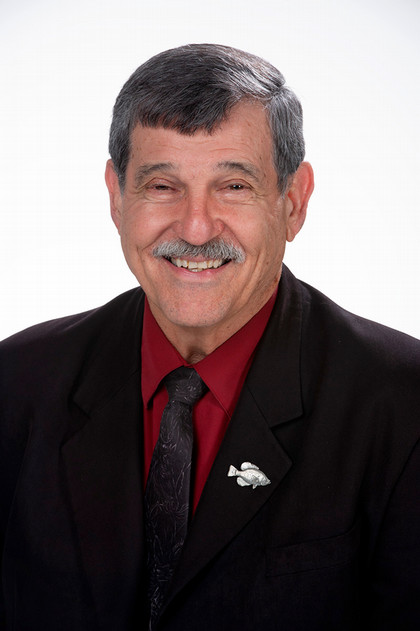
Triplett came to Pitt State on a football scholarship to play for Coach Carnie Smith.
“Little did I know then that I’d wind up working across the street from the stadium for a good chunk of my life,” he said in 2017.
After earning a bachelor’s and master’s, Triplett served in the Navy during the Vietnam War, then earned his PhD at the University of Kansas.
He was hired as an assistant professor in 1981 and was appointed Biology chair in 1985, serving 23 years in that role until stepping down in 2008 to focus solely on teaching and conservation projects.
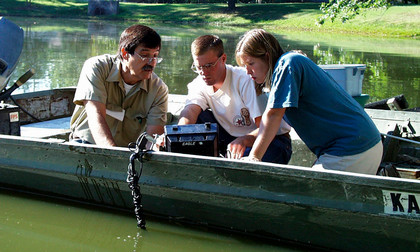
From his childhood spent fishing in creeks, Triplett’s love of aquatic science never waned. His teaching and research focused on fisheries, fish behavior, aquatic ecology, ichthyology, herpetology, watershed management, stakeholder processes, and public policy development in natural resources management.
He was well-known for organizing impactful student field work experiences and study trips to sites such as Dauphin Island, Alabama.
“I was his first graduate student, and we shared a common love of fisheries and herpetology,” said Dan Mosier (BS '81, MS '85), whose first project was with Triplett at the Mined Land Area near Big Brutus in its early days. “He was a super mentor for me, and very patient. I learned a lot from him not just about the scientific community, but life in general.”
Mosier retired this fall as the director of the Farlington Fish Hatchery after nearly 40 years with Kansas Wildlife and Parks. He used what he learned from Triplett throughout his career, including valuable lessons in the field and how to analyze situations and tasks and look at things objectively.
“He was probably second only to my dad in terms of the impact he had on my life,” Mosier said.
Megan Duffey-Yates (BS '11 MS '13), who was among his last students and now works as a private land conservationist with Missouri Department of Conservation, recalled his influence on her education and career.
“Dr. Triplett, known to many students lovingly as Dr. T, was by far the professor who had the biggest impact on me,” Duffee-Yates said. “He treated me like an individual, took the time to get to know me, and after I graduated became a friend who cared about my career goals and attended many of my career presentations.”
“He served on some of the same committees as me and has told me how proud of me he was of my career choices. He will always hold a spot in my heart as my most favorite professor."
In 2014, he retired from teaching but didn’t stop serving, moving into an emeritus office in Hartman Hall where he could curate the PSU Museum of Ichthyology and Herpetology and spearhead initiatives related to sustainability.
“As long as I have some ability to persuade, I’ll keep doing it,” Triplett said at the time. “...my expertise and knowledge are what I have to offer. I still have a little bit of influence in this area and I want to use it to make a difference in our world and at the university. When I get to the point where people aren’t paying attention anymore, well...I’ll just go fishing.”
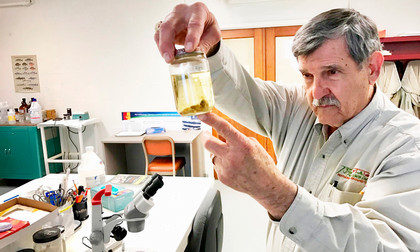
Triplett helped to launch the university’s new Students for Sustainability organization and create the state’s first Bachelor of Integrated Studies in Sustainability, Society, and Resource Management.
He lobbied hard for the new degree, advocating that it would put graduates in a position to help solve some of the nation’s most difficult and important problems.
"This is a good example of the ways in which we are preparing students for problems that haven't been created yet," Triplett said after it was implemented.
Former PSU President Steve Scott said Triplett made a “huge difference."
“His leadership has contributed to the university being a better steward of the environment both in our curriculum and in our operations,” Scott said. “His commitment to preserving the earth's natural resources has served all of us well and his contributions will benefit the many generations who will follow us.”
Scott noted that Triplett also provided leadership that led to the campus adopting a tobacco-free policy – the first university in the state to do so.
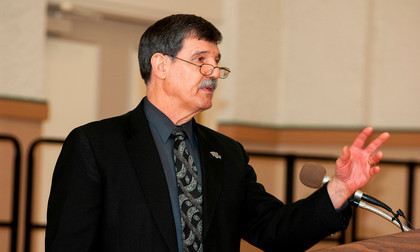
Dean of Students Jon Bartlow, who replaced Triplett as the chair of the University Committee for Energy and Resource Conservation, and later the University Sustainability Committee, described him as an excellent mentor and tireless advocate.
"It is not an exaggeration to say that every sustainable effort that has taken place on this campus and in this community over the past 25+ years has been directly connected to Jim’s tireless efforts,” Bartlow said.
Triplett served on the Governor’s Solid Waste Advisory Committee for many years, was chair of the Neosho Basin Advisory Committee from 1985 to 2015, and was chair of the Crawford County Solid Waste Planning Commission.
He was a leader in the Grand Lake Watershed Alliance Foundation and a member of the Spring River Watershed Restoration and Protection Leadership Team.
“I want to do this because it’s important that people work together to ensure that the resources we depend on are still around for future generations,” Triplett said of his sustainability efforts. “It became obvious through the years that we were likely to lose a lot of our natural resources on which we depend, if we don't take better care of them. We have a chance to make a difference through the concept of sustainability.”
He was instrumental in forming the Southeast Kansas Recycling Center in Pittsburg and served as its president for many years. In November, the organization dedicated its primary building in his name.
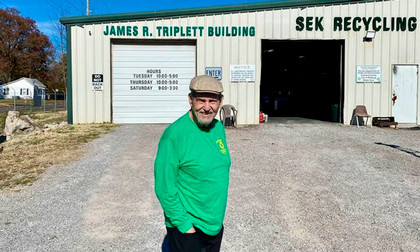
“Knowing and working with Jim renewed my faith in humanity,” said Pittsburg Deputy City Manager Jay Byers. “Seeing someone work so tirelessly to improve the human condition dismantles cynicism and disengagement. Speaking to him, you could no longer neglect the environment. He epitomizes stewardship.”
Spanning decades, Triplett wrote numerous articles and gave many presentations about natural resources, aquatic life, conservation, and sustainability for regional, state, and national audiences.
Triplett and his wife of 26 years Shirley Drew, a recently retired professor of Communication, also implemented sustainability strategies at their rural home including solar energy, a ground source heat pump, butterfly gardens and native grasses, and he drove a hybrid car.
In 2017, he was honored as the Kansas Conservation Champion by the Kansas Natural Resources Council.
Current PSU President Dan Shipp said his conversations with Triplett over the past few years were “simply wonderful.”
“I will always treasure my time with him and learning about Pitt State through his experiences and many contributions,” Shipp said. “He will be missed greatly, but the work he started will most certainly continue.”
All that he did in life, Triplett said, he tried to relate to resource management.
“I think it goes back to my grandpa. He’d go out to catch those minnows and he’d take me along. Those trips down the creek, spending time with a cane pole, exploring upstream, riffle to riffle — I have a strong affinity for the streams and things that live in the streams, and it became part of my world view. It just makes sense that I’d want to teach others and work to protect it.”